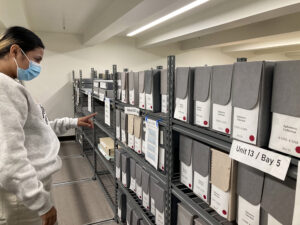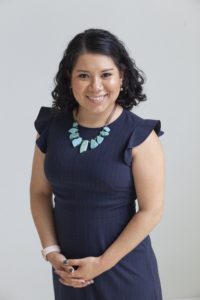
We now invite you to explore Researching Latino/a/x DC, the online edition of A Guide to Selected Research Materials Relating to the Latino/a/x Communities in Washington, DC! This new, easier-to-navigate version is the DC History Center’s first research guide to include Spanish translation of key text!
Published in May 2021, A Guide to Selected Research Materials Relating to the Latino/a/x Communities in Washington, DC, was a standalone PDF made available through the DC History Center’s website. The guide was the result of a 16-week independent research project developed by Mariana C. Barros-Titus, an undergraduate student at the University of the District of Columbia (UDC). Her goal was to meet a research services challenge faced by the DC History Center’s Kiplinger Research Library.
And now, we’ve brought new talent to the team! Kelssi Aguilar, a UDC student, is currently serving as Latinx community outreach intern. Kelssi is tasked with moving us ahead to the next phase of the guide, which is produced on a platform that allows us to easily add additional resources as they become known and/or available, and even for the public to suggest resources. Born and raised in Washington, DC, Kelssi grew up in a Mexican immigrant household with her two siblings, spending each summer in Morelos, Mexico where she learned to love the rich culture of Latin America. Having grown up in a multicultural city, specifically one heavily focused on politics, Kelssi has made it her mission to become an ally, organize, and advocate for the communities around her. She involves herself in community projects in hopes of being able to learn the history of these communities and build bonds. Creating a more accessible research guide is one way Kelssi has seen to do so.

We’ve heard from researchers that the guide saves valuable time by collating information about publicly available resources located across numerous local repositories. This is exactly what we’d hoped to accomplish with this initial step! We’ve also received notices from repositories themselves about additional resources, which we then add to the guide accordingly. This, too, is among the aims of the project, and we look forward to continuing to receive these notices of additional resources that will help researchers amplify local Latinx history. As Kelssi told us, “I am very excited to be a part of this journey of connecting and creating relationships. I am most excited for the resources, change, and acknowledgment that this process is to bring Latinx communities.”

In that spirit, we certainly will continue to do more: In addition to specific compiled resources, the PDF includes an essay by Mariana and thoughts on next steps for the DC History Center’s engagement with the Latino/a/x community.
With that, we’re also thrilled to announce that in her post-graduate capacity as the DC History Center’s Community Outreach Fellow, Mariana will be planning a Latino/a/x outreach program, slated for Spring 2022. Mariana plans to consult with a community-based working group to develop this program; all those interested in contributing to the working group are encouraged to reach out to Mariana via programs@dchistory.org!